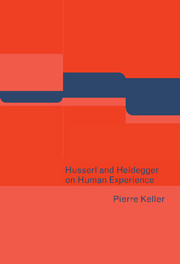Book contents
- Frontmatter
- Contents
- Introduction
- 1 Experience and intentionality
- 2 Husserl's methodologically solipsistic perspective
- 3 Husserl's theory of time-consciousness
- 4 Between Husserl, Kierkegaard, and Aristotle
- 5 Heidegger's critique of Husserl's methodological solipsism
- 6 Heidegger on the nature of significance
- 7 Temporality as the source of intelligibility
- 8 Heidegger's theory of time
- 9 Spatiality and human identity
- 10 “Dasein” and the forensic notion of a person
- Select bibliography
- Index
9 - Spatiality and human identity
Published online by Cambridge University Press: 02 November 2009
- Frontmatter
- Contents
- Introduction
- 1 Experience and intentionality
- 2 Husserl's methodologically solipsistic perspective
- 3 Husserl's theory of time-consciousness
- 4 Between Husserl, Kierkegaard, and Aristotle
- 5 Heidegger's critique of Husserl's methodological solipsism
- 6 Heidegger on the nature of significance
- 7 Temporality as the source of intelligibility
- 8 Heidegger's theory of time
- 9 Spatiality and human identity
- 10 “Dasein” and the forensic notion of a person
- Select bibliography
- Index
Summary
In recent metaphysics, a growing consensus has emerged that a revision of the traditional and common-sense conception of personal identity is required. Common-sense would have it that we are individuals characterized by a certain distinctive identity. This numerical identity makes each of us who we are over the entire period of our lives. The revisionist view finds our intuitions about our own identity to be ill-founded. Personal identity is reduced to mere relations of similarity between certain sets of mental and physical events. Instead of thinking of persons as characterized by strict numerical identity over time, the reductionist about personal identity takes mental or physical states to be numerically distinct person-stages. These person-stages are then regarded as ontologically more basic than persons who have identity over time. The psychological continuity that holds between person-stages may not always be one to one or transitive. This means that each person-stage may have more than one set of past and future person-stages of which it is the continuant and which are its continuants. Thus, persons or, rather, person-stages may coalesce and divide in a manner analogous to the fusion and fission of protists (such as amoebae).
Heidegger offers a critique of reductionist tendencies in the traditional metaphysics of personal identity that anticipates some of the basic assumptions of the new theory. His discussion of personal identity has generally been ignored, even by scholars of Heidegger's thought.
- Type
- Chapter
- Information
- Husserl and Heidegger on Human Experience , pp. 207 - 226Publisher: Cambridge University PressPrint publication year: 1999



